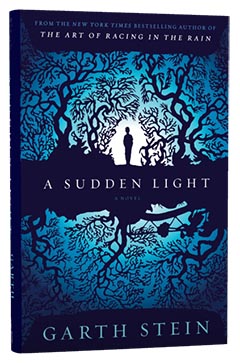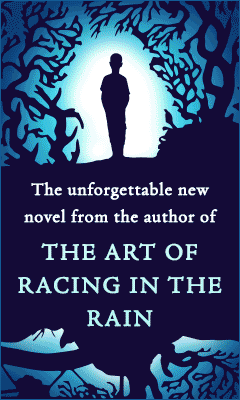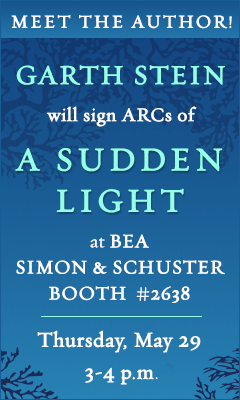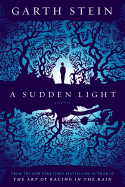A Sudden Light
by Garth Stein
In his first novel since the beloved The Art of Racing in the Rain, which spent more than three years on the New York Times bestseller list and has been translated into 35 languages, Garth Stein delivers A Sudden Light, a richly layered, atmospheric epic brimming with ghosts, family secrets, a dark legacy and a tragic love affair that alters the course of several generations of the fictional Riddell family.
The narrator of Stein's tale is the adult Trevor Riddell, who recalls the summer of 1990 when he was a precocious, curious, bookish 14-year-old, first visiting his family's ancestral Pacific Northwest estate. While growing up in Connecticut, Trevor has heard stories of how his patriarchal forebears built and lost their fortune in the Northwest timber industry. He has heard stories about the Riddell family curse.
In that fateful summer, Trevor's father, Jones, is dealing with his failing marriage in the fallout of a forced bankruptcy--he's lost his wooden boat–building business as well as his family's house in the Connecticut countryside. While Trevor's mother is visiting her native England during a trial separation, father and son set out on a momentous journey.
For the first time in more than two decades, Jones returns to Riddell House, an impressive but dilapidated mansion on a bluff overlooking Puget Sound. He's back in the family fold on a mission. He and his younger sister, Serena, plan to place their father, Samuel, who is rapidly declining from dementia, in a nursing home after having him sign over power of attorney. Once in charge of his affairs, they plan to sell Riddell House and the surrounding acreage to a developer and split the profits.
Trevor, too, has an agenda--he wants to keep his parents together. If his father has some cash, Trevor believes, his estranged parents will reunite. "My strategy was to fix my father by helping him to fix his broken life. It was a simple plan, because I thought it was just about money," he confides. He has another reason for accompanying his father to Washington State. He wants to learn about the past in the hopes of forging a closer relationship with his father, who has always been a distant figure in Trevor's life.
Trevor is struck speechless at his first sight of Riddell House, a three-story mansion with a pillared façade constructed of whole trees, "a regiment of silent, glaring giants." He barely crosses the threshold when he senses there is something different about this residence, which is "alive, almost, and breathing." It's not long before he hears his name whispered while he's alone, along with other signs of a supernatural presence. His fear at being sought after by a ghost is trumped by his desire to know who is trying to reach him and why.
A self-described truth seeker, Trevor roams Riddell House, searching for answers about the dead and the living. How did his grandmother die, and why won't anyone talk to him about it? Why did his father leave Riddell House and never return? Has Serena forgiven Brother Jones for not coming back for her as he had promised? Trevor eavesdrops on conversations and decodes spirit-guided missives scribbled on scraps of paper by Grandpa Samuel. He explores secret passageways, stumbling on a hidden study and unearthing long-forgotten diaries.
This is where Stein really adds depth to the novel, weaving the contemporary storyline with an intriguing historical narrative and using Trevor to tie the two threads together. We take a trip into the past with the boy as he reads journals, field notes and letters penned by his great-great grandfather, Elijah Riddell, founder of the family timber empire; Elijah's son, Ben; and Ben's lover, Harry.
In the early 1900s, Ben's passionate environmentalism is at odds with the family livelihood, while his love for another man goes against the mores of Victorian society--both proclivities of which Papa Elijah disapproves. But after Ben dies unexpectedly, Elijah vows to fulfill his son's wishes and preserve the land surrounding Riddell House.
Ben has his own reasons for wanting the land preserved. He blames himself for the accidental death of his lover and fellow conservationist, Harry, and won't pass into the spirit realm until he assuages his guilt. This is why he seeks Trevor's help--as an ally to keep the land pristine and undeveloped. The legal time limit on Elijah's mandate that future generations of Riddells adhere to his wishes has run out. The only thing standing in the way of Serena and Jones's desire to raze the property is their father, Samuel, who refuses to let the house go.
Swayed by Ben and Harry's personal story, and by their vivid descriptions of the lush Pacific Northwest woods where they find joy and adventure communing with nature and scaling sky-high trees, Trevor is determined to help his "uncle of some level of greatness" fulfill his heart's desire. But to do so means going against his father's needs and wishes, and possibly destroying the only chance his parents will reunite.
While Trevor is wrestling with his conflict, disturbing facts come to light about his mysterious Aunt Serena, who has her own plans for the family's future. Realizing it's not ghosts he has to fear but the living, Trevor sets in motion a plan that is both brave and foolhardy. The tension level rises dramatically as the novel spirals toward a powerful, poignant conclusion. When all is said and done, the Riddell curse might finally be broken and the debt settled. But at what cost?
Part epic family saga, part ghost story and part mystery, A Sudden Light explores the fragile yet complex ties that connect people to one another, the weight of generations past on generations present, and the idea that what makes us human doesn't end with death. Like The Art of Racing in the Rain, it's heartrending and uplifting, entertaining and thought-provoking--a beguiling novel about love, tragedy, hope and redemption.








